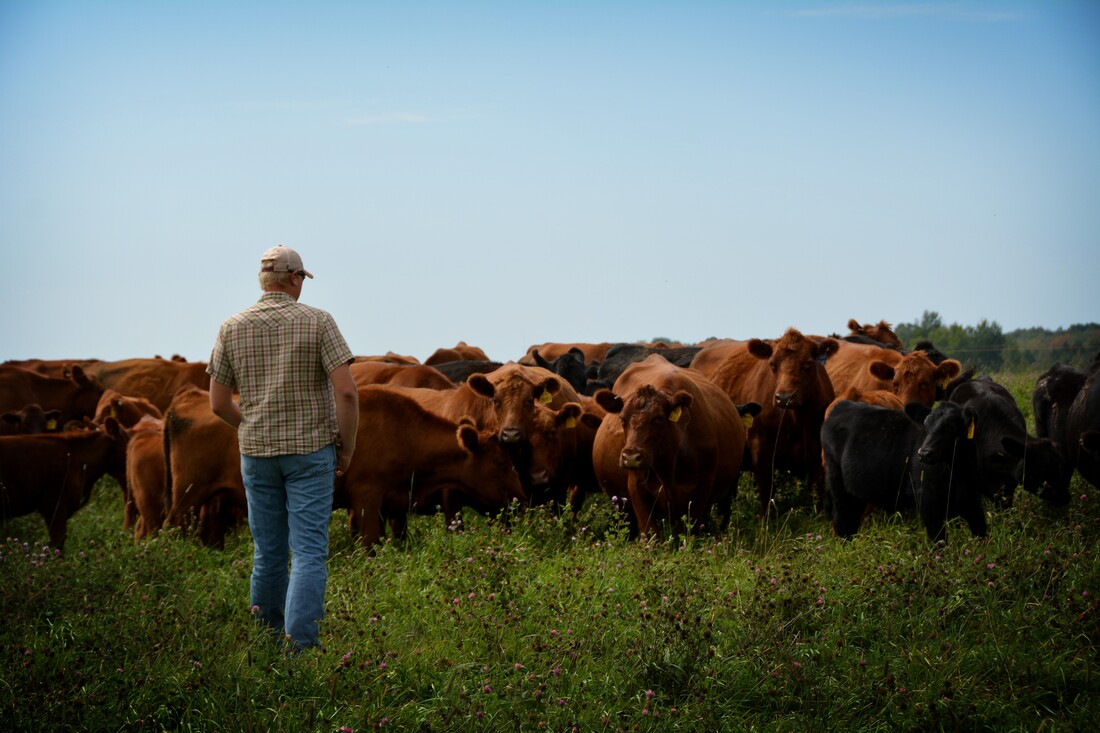Mission
|
Food System 6 (FS6) is a non-profit business accelerator whose mission is to support impact driven entrepreneurs as they transform how we grow, produce, and distribute food. The organization runs a comprehensive program that mentors entrepreneurs by coaching them through a wide range of business and organizational needs. FS6 also works to educate stakeholders on the unique capital needs as related to redefining the food system.
The FS6 program prioritizes working with entrepreneurs who are building a food system that focuses on health, sustainability, and justice - whether through food-tech, supply chain, or access-focused solutions. |
PastureMap, FS6 Cohort 1
|
Our Vision for Food System 6
The history of the world’s food systems is earmarked by major shifts - from hunting, gathering, fishing, and foraging through the current industrial food system. We believe that the 5th and current food system has exhausted its growth trajectory and that the world is, once again, staged for a major transformation in the way that food is grown, distributed and produced. The current large-scale industrialized model of production is no longer sustainable for our planet and a sixth, more holistic system, is needed to replace it.
We believe that we are at the stepping-off point for the sixth food system and that health and sustainability are emerging as the desired characteristics of how we grow, produce, and distribute food. There is a growing recognition among many stakeholders that there is a need to think "beyond sustainability" toward designing a system that not only sustains itself over time, but is focused on regenerative strategies that improve our natural and human ecosystems. We see a growing awareness that the food system is not merely the sum of its parts, but that all parts of the system relate to and affect one another in complex and sometimes indirect ways.
Our vision for Food System 6 is for a system that is built on increased collaboration, a greater recognition of the interrelation of the food we are producing and the people that produce and consume it, and an increased commitment to building sustainability and regeneration into the fiber of production, consumption, and waste systems.
To read more about our vision for the sixth food system and the history of and evolution of the food system up to now, click here.
We believe that we are at the stepping-off point for the sixth food system and that health and sustainability are emerging as the desired characteristics of how we grow, produce, and distribute food. There is a growing recognition among many stakeholders that there is a need to think "beyond sustainability" toward designing a system that not only sustains itself over time, but is focused on regenerative strategies that improve our natural and human ecosystems. We see a growing awareness that the food system is not merely the sum of its parts, but that all parts of the system relate to and affect one another in complex and sometimes indirect ways.
Our vision for Food System 6 is for a system that is built on increased collaboration, a greater recognition of the interrelation of the food we are producing and the people that produce and consume it, and an increased commitment to building sustainability and regeneration into the fiber of production, consumption, and waste systems.
To read more about our vision for the sixth food system and the history of and evolution of the food system up to now, click here.
How We Think About Impact
In an effort to identify the innovations that will usher in this new food system, FS6 has iterated on our selection process over the years in order to develop a system for measuring and quantifying holistic impact. Although we recognize that this is an iterative process, we have narrowed in on our current framework as a crucial tool for identifying innovations that are making change through systems-based solutions.
The FS6 impact pillars are adapted from Whole Measures for Community Food Systems, a values-based strategic planning and evaluation framework developed by the Center for Whole Communities and the Community Food Security Coalition.
The FS6 scoring algorithm focuses on four pillars of impact: Healthy People, Sustainable Ecosystems, Vibrant Farms, and Justice & Fairness.
The FS6 impact pillars are adapted from Whole Measures for Community Food Systems, a values-based strategic planning and evaluation framework developed by the Center for Whole Communities and the Community Food Security Coalition.
The FS6 scoring algorithm focuses on four pillars of impact: Healthy People, Sustainable Ecosystems, Vibrant Farms, and Justice & Fairness.
- By focusing on Healthy People, we want to make sure that the innovations that we are working with recognize the interrelationship between the food system and the people that support it along the way. We work with companies that are increasing access to healthy, culturally relevant food across communities that have traditionally had limited access to these resources, in order to decrease the inequities that have brought us to where we are today.
- We work to promote Sustainable Ecosystems by supporting innovations that protect and improve soil, water, air, and energy quality by reducing or eliminating contaminants and protecting biodiversity. Our goal is to mitigate the impacts of climate change by identifying opportunities for recycling, upcycling, and repurposing waste streams and by supporting agricultural practices that sequester carbon and educate communities about the impacts of climate change, as influenced by agriculture.
- We focus on working with companies that promote healthy, sustainable, and Vibrant Farms by prioritizing the health and safety of farmers, farm workers, and farm animals throughout their lives. And to those businesses that help increase the market opportunities and economic viability of sustainable farms.
- And last but most certainly not least, FS6 strives for a more Just and Fair food system by supporting innovations that decrease food insecurity; protect the rights of workers across the food supply chain; and affirm diversity in regards to race, class, ability, gender, religion, sexual orientation, and other cultural identities. We seek out companies that are addressing the systemic inequalities of our food system in order to dismantle injustice, uphold the dignity and quality of life of food workers; and heal the social, historical, and cultural connections among people, food, and the land.
To learn more about the innovations in our cohort, and how they work towards our impact pillars, visit our Portfolio page.


